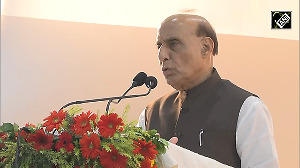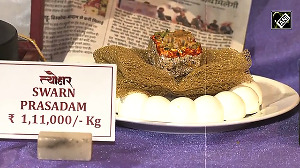The International Atomic Energy Agency Board is unlikely to take up the issue of India-specific safeguards at its scheduled meeting next week in Vienna but could hold a special meeting in the wake of government deciding to approach the nuclear watchdog.
IAEA sources said the regular board meeting on Nov 22-23 would take up implementation issues on current safeguards and technical cooperation projects undertaken by the agency.
But the IAEA can convene a special board meeting anytime after the regular board meeting to discuss India-specific safeguards for which the agreed draft has to be readied by January 2008, Atomic Energy Department sources said.
The draft has to be readied by January 2008 to enable the US Congress to vote on the 123 agreement in the first quarter of next year, sources said.
Meanwhile, nuclear experts said India needs to focus on the corrective measures to be built within the IAEA safeguards especially on assured and continued fuel supply during negotiations with it.
There are many clauses under Hyde Act of US which are binding on 123 bilateral agreement between India and US and the supply of uranium could be stopped anytime, they feared.
The government has been telling from the beginning that they would make corrective measures that would be built-in the India-specific safeguards, they said.
"We know that assurance of fuel supply is not a IAEA matter, it is a matter between supplier and recipient but still corrective measures at the safeguard level can be taken up," they said.
Dr A N Prasad former Director, BARC and IAEA envoy said "this is going to be the most difficult of the corrective steps that India will be taking. Although so far India has not spelt out, but it can insist on."
However, one has to see to what extent India can insist on and to what extent IAEA will agree to this, he said.
Regarding the safeguards, since India is already having 'item specific' (for facility and for material) safeguards which are generic in nature, the India-specific safeguards for all its civilian nuclear plants (as per the separation plan) could be on the same lines, said officials who did not want to be quoted.
India-specific safeguards will be with 'an additional protocol' (which is country specific) which is already in place for Kudankulam plants imported from Russia as "subsidiary arrangements".
In the NPT parlance it will placed under the Agency's safeguards system called Information circular (INSCIRC) of 1966.
This is in contrast to the INSCIRC 153 meant for those who signed nuclear Non-Proliferation Treaty and non-weapon countries like Iran having 'the additional protocol' which is intrusive in nature.
That means, India can benefit from the safeguards mechanism which are reactor-specific and utility-specific and would be closer to the five nuclear weapon (P-5) countries and not as a non-weapon state (country), they said.
This could be essentially on the same lines as that of the safeguards arrangement made between India and IAEA for two units of the Tarapur atomic power plant set up in 1969 and two units in Rajasthan in 1971.





